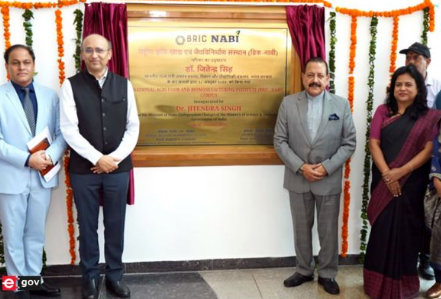India Launches First Biomanufacturing Institute for Agri-Food Innovation
Dr. Jitendra Singh inaugurated the BRIC-National Agri-Food Bio-Manufacturing Institute in India. This is the country’s first biomanufacturing institute, aimed at revolutionizing the agri-food sector through advanced biotechnology. The initiative aligns with Prime Minister Narendra Modi’s vision of a Viksit Bharat, or developed India.
Government Commitment
Dr. Singh highlighted the Government of India’s commitment to innovation in agriculture. The goals include generating employment and promoting environmental sustainability, which are essential for a future-ready India. The government prioritises science and technology, as evidenced by the launch of the BioE3 policy.
BioE3 Policy
The BioE3 policy focuses on biotechnology’s role in enhancing the economy, creating jobs, and protecting the environment. Dr. Singh stated that biotechnology and synthetic production will transform agriculture and elevate India’s global scientific standing. India is among the first nations to implement a dedicated biotechnology policy.
From Traditional to Synthetic Production
The new policy aims to shift India from traditional manufacturing to synthetic production. This transition will utilize advanced and cost-effective technologies. It is expected to yield sustainable and eco-friendly solutions, contributing to India’s economic growth.
BRIC-NABI Formation
The BRIC-NABI was formed by merging the National Agri-Food Biotechnology Institute (NABI) and the Centre of Innovative and Applied Bioprocessing (CIAB). This merger aims to bridge the gap between research and commercialization. It will facilitate pilot-scale production and bring innovative agricultural technologies to market.
Research and Development Focus
The institute will enhance agricultural research and development. It aims to create high-yield, disease-resistant crops, biofertilizers, and biopesticides. These innovations support the government’s goal of doubling farmers’ income and encouraging sustainable farming practices.
BioNest Incubation Centre
A key feature of the BRIC-NABI is the BioNest Incubation Centre. This hub supports startups in agriculture, food, and bioprocessing. It aims to assist young entrepreneurs, women, and farmers in accessing industry partnerships and innovation networks. The center will facilitate the commercialization of agri-food innovations.
Private Sector Involvement
Dr. Singh stressed the need for private-sector participation. He urged industry players to invest in initiatives that unlock market potential. This involvement is crucial for generating sustainable employment for India’s youth. The BioNest initiative aligns with the Make in India vision, promoting self-reliance and industrial growth.
Upcoming Biomanufacturing Workshop
A Biomanufacturing Workshop 1.0 is scheduled for December 2024. This event will explore biomanufacturing applications across agriculture, food, pharmaceuticals, and energy sectors. It aims to provide vital information about sustainable production techniques. The workshop will cater to researchers and industry professionals.
Addressing Brain Drain
Dr. Singh expressed concerns about the brain drain of Indian scientists. He encouraged young researchers to remain in India. He brought into light the country’s evolving scientific ecosystem, which now competes with global institutions. Developing indigenous expertise is vital for strengthening India’s global influence in science and innovation.
Significance of BRIC-NABI
The inauguration of the BRIC-NABI represents a major milestone in India’s journey towards a science-powered economy. With initiatives like BioE3 and BioNest aims to establish itself as a global leader in knowledge and innovation. This will contribute to sustainable growth at both domestic and international levels.
Month: Current Affairs - October, 2024
Category: India Nation & States Current Affairs








